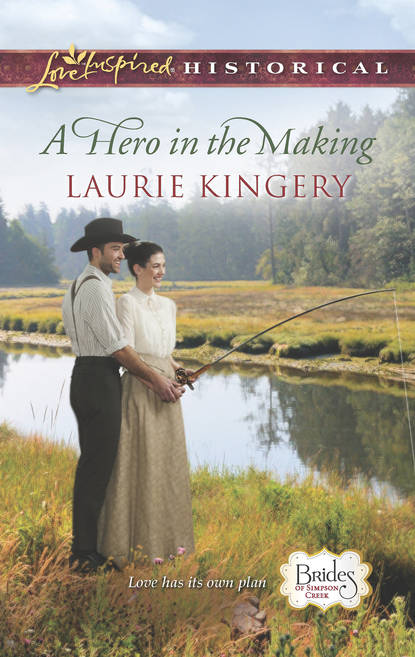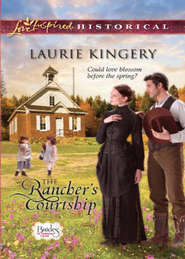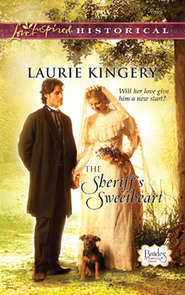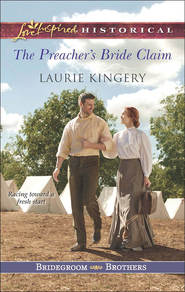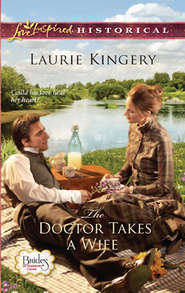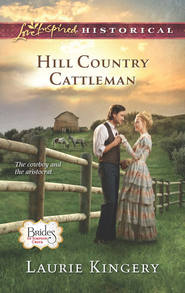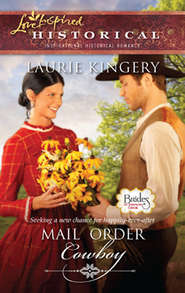По всем вопросам обращайтесь на: info@litportal.ru
(©) 2003-2025.
✖
A Hero in the Making
Настройки чтения
Размер шрифта
Высота строк
Поля
“In fifteen minutes,” he said. “Thanks for the sandwiches and that fine coffee, Miss Ella Justiss.”
“You’re welcome. Come back for supper, if you like. My fried chicken is the best in San Saba County.”
“I just might do that,” he said. He picked up the wrapped sandwich and exited through the saloon.
If she wanted to take a few minutes out to watch a medicine show, she could, Ella told herself. She’d been her own boss since leaving her job at the hotel restaurant and Mrs. Powell, the tyrannical cook who’d made her life miserable. She didn’t do business in midafternoon, anyway—those looking for a bite to eat at noon had already found it, either at her café or the hotel restaurant, and no one was seeking supper yet.
Ella locked the door to the alley, just in case the drifter woke up and tried to find his way back inside, then reached into the cigar box that held the pitifully paltry revenue from the day so far and emptied it into her reticule.
She went into the empty saloon and caught sight of Detwiler sitting on a chair at the piano, picking out a tune she didn’t know, though she did recognize the fact that the piano badly needed tuning. So George had been the one playing at the time the drifter had been attacking her.
He looked up as she approached. “Sorry about what happened, Miss Ella. Guess I shoulda known that fellow was too shifty-eyed to let him go back there, what with you bein’ alone.”
She forced a bright smile to her lips. “No harm done, George. Mr. Bohannan intervened.”
“Seemed like a nice fella, even if he is one a’ them snake-oil salesmen.” Now the saloonkeeper’s eyes turned apologetic as he cleared his throat. “I’m not sure our arrangement’s gonna work out, Miss Ella, from the number of times I’ve had to step in and keep some yahoo from botherin’ ya. I don’t want anything...bad t’ happen to ya, after all.”
Desperation gripped her with icy fingers. She could not lose the use of Detwiler’s back room, not when she had nowhere else to run her café. And there was very little in the way of other work for a decent woman if one was not a wife, like some of the ex-Spinsters, or a schoolteacher, like Spinsters’ Club member Louisa Wheeler.
“Please, George,” she said, clasping her hands together. “I’ll only need the space until I can get my own place,” she said, refusing to think about how long that would take. “I can’t go back to the hotel—Mrs. Powell’s already hired Daisy Henderson to wait tables in the restaurant.” Even if her job had not already been taken, it would be too galling to submit to the cook’s bullying again. Nor did she want to move on to yet another town.
Detwiler sighed. “All right. You kin stay for the time bein’. I know ya don’t have any other good options. I’ll try to keep a better eye on your customers. Maybe we could rig up some kinda bell rope that would ring behind the bar or somethin’ if you get another bad‘un.”
Ella smothered a snort. As noisy as it got at times in the saloon, she could probably fire a cannon back there and he wouldn’t be able to hear it. But it was nice knowing Detwiler cared about her safety, at least. She knew him to be a decent man. Even the women who served the whiskey in his saloon weren’t compelled to do anything more, and if they took customers upstairs, that was entirely up to them. Detwiler took no cut of it. And Detwiler had given her a chance to go into business for herself instead of remaining under Mrs. Powell’s bullying thumb at the hotel.
“Thanks,” she said. “I’m just going to go down the street for a few minutes and see the Cherokee Medicine Show. I’ll be back before anyone’s likely to mosey in looking for supper.”
“Gonna buy ya some snake oil, eh?” Detwiler asked with a chuckle.
“Hardly,” she said, and pushed through the batwing doors to the outside.
Down the street she could see a buckboard with an extralong wagon bed pulled up in front of the mercantile. The wagon bed was gaily painted in emerald-green with navy trim and an inscription along the side in fancy script lettering. As she drew closer, she saw that the inscription read The Cherokee Marvelous Medicine Show. In the middle of the wagon bed stood a narrow podium, with a box on either side stacked full of amber bottles—no doubt the famous Cherokee elixir.
Then she saw Nate emerge from the other side of the wagon, holding a stool and a banjo he’d evidently brought out from storage beneath the wagon. She watched as he placed the stool to one side of the podium, laid the banjo on one of the boxes and, using the front wheel of the wagon, climbed gracefully aboard. He settled himself on the stool and picked up the banjo. For a moment, he tried each of the strings, adjusting one or two as needed at the end of the neck, then began strumming a few chords. Then his fingers began flying over the frets and strings as he played a rollicking tune that reminded her of a minstrel show she’d once seen in New Orleans.
Why, he’s really good, she marveled. She hadn’t expected him to have such musical talent.
She was distracted then by a flash of color down the street, and made out a swarthy, strangely dressed man in some sort of outlandish striped turban and matching waist sash, pacing up and down the street, holding a speaking trumpet to his lips. He cried, “Come one, come all, and learn of the marvelous, wondrous, extraordinary medicine first discovered by Cherokee healers. Hear about the amazing cures this medicine has brought about, from dreaded diseases like consumption, dropsy and apoplexy, to the everyday ills of catarrh, melancholia and piles!”
Everywhere up and down Main Street, people turned around and heads poked out of shops to see what was going on, including a fellow at the barbershop whose face was half shaved, half covered in thick white lather. Not much happened out of the ordinary in Simpson Creek, Texas, and its inhabitants didn’t want to miss it when it did.
So this was Robert Salali, the man Nate Bohannan had said he worked for.
Salali strode to the end of Main Street, calling through his speaking trumpet, and Ella saw the postmaster emerge from the post office and Sheriff Bishop and Deputy Menendez amble out from the jail. The medicine-show man was obviously in his element, drawing the crowd with his singsong pitch and stopping to exchange remarks with individual townspeople, even chucking a baby held by a young mother under the chin.
When Salali headed back toward the wagon-bed stage, Ella heard Delbert Perry, the town’s handyman, ask him, “How much is this amazing medicine, mister? Does it cure a bad liver?”
“Yes, my friend, it’ll underange a deranged liver faster than a crow can fly from here to San Saba. As for the price, come listen to our show and we’ll sell it to you at a discount for being the first person to ask, but I promise you, it’ll be the best money you ever spent!”
Ella couldn’t help chuckling at the idea of an underanged liver. Everyone knew Delbert Perry had been the town drunk before he’d gotten right with the Lord, and he hadn’t touched a drop of liquor since then, but years of hard living had taken its toll, leaving him with a permanently veiny, reddened nose and a paunch that was at odds with his skinny arms and legs.
Bohannan spotted her then, and flashed an intimate smile and a wink that had Ella blushing and wishing she was wearing something besides her plain, serviceable dark blue skirt and waist.
Don’t be silly, she told herself sternly. Why should she give two hoots about what a charming stranger working for a medicine-show man thought of her? He’d be gone tomorrow and she’d never see him again. And she had a goal to accomplish that didn’t include falling for the wiles of a smooth talker like Bohannan, even if he had saved her from that drifter. She should be using this time to bread chicken for her supper customers, and not be out here on the street lollygagging when she had no intention of wasting her pennies on this quackery. She hoped Perry wouldn’t buy any, either; these nostrums were usually half alcohol and it might cost him his hard-won sobriety.
Despite her reservations, though, Ella joined the crowd gathering in front of the medicine wagon. She might as well see the show, since that was what she’d come out for.
Bohannan strummed faster, escalating the music to a frenzied pace. Then just as suddenly, he stopped and laid the banjo aside, then stood and faced the crowd.
The only noise was the buzzing of horseflies plaguing the rumps of the horses tied up to a nearby hitching rail.
He leaned forward, making eye contact with everyone in the crowd in turn, until Ella found herself holding her breath. Even the flies seemed to cease buzzing.
“I’m Nathan Bohannan, and it is my honor and privilege to be the one to introduce you to the purveyor of the amazing elixir of health, Cherokee Marvelous Medicine. And now, direct from a secret Cherokee fortress in the Smoky Mountains of Tennessee, I give you Robert Salali! Let’s have a round of applause to welcome him, shall we, folks?”
Chapter Two
Now the medicine-show man ascended to the wagon bed via a set of steps that Bohannan had apparently placed there for him. He carried himself like royalty ascending to the throne instead of a gaudily painted wagon.
The medicine-show man paused a moment, surveying the crowd before him with a lordly air, a king in front of his subjects, as if he wore ermine-trimmed robes instead of buckskin trousers and a navy blue tunic. Around his neck was a necklace strung with what looked like alternating bear and panther claws. An eagle feather stuck out of the back of his striped turban. Raven-black hair brushed his shoulders.
He certainly had a presence, Ella thought before he had spoken so much as a single word.
When he opened his mouth at last, a torrent of syllables poured out, all of them strange and foreign to her ears. “I am Robert Salali,” he proclaimed, switching to English. “What I said in the Cherokee tongue is this—I bring you greetings in the name of the Cherokee Nation.”
Ella could not place his accent. It was neither Yankee nor a Southern drawl nor quite foreign.
“How did I come by the knowledge of this astonishing medicine, you may be wondering?” Salali said. “It is quite a tale. I saved a Cherokee chief from an agonizing death at the claws of a fierce, enormous bear. In gratitude, the chief gave me this necklace, these articles of Cherokee clothing and the knowledge of the ingredients of the elixir. He said I could share the elixir with those I wished, or keep it to myself. ‘But how could I be so selfish?’ I asked him. ‘Ah, you have a great soul,’ the chief told me. ‘So I will give you a new surname, which means “Generous Heart” and you may share the elixir as you choose. It is a gesture of friendship to our white brothers.’”
“They must be more neighborly Injuns than the Comanches, then,” somebody muttered, and there were answering chuckles.
“That must mean this medicine’s free, I reckon!” hooted one of the town’s graybeards.
Salali smiled and raised his arm majestically to quiet his audience. “Not free, no, for what is free is often not valued, and the ingredients of our amazing Cherokee medicine do cost money to obtain. I must charge a pittance or I would not be able to produce it as a service to mankind.” He pulled out a rolled scroll of parchment from his pants pocket, and with a flourish, undid the red satin ribbon that bound it and handed it to Bohannan. “My assistant will read some testimonials from satisfied customers,” he said.
Ella listened as Bohannan read accounts of a woman cured of cataplectic hysteria—whatever that was—who had come back to her right mind and made her husband a hearty breakfast the very next day after starting to take Cherokee Marvelous Medicine, a boy cured of lameness, a man cured of heart seizures, a woman of insomnia. Nothing in his tone hinted at the cynicism he’d revealed earlier to her when he’d said the medicine man “put on a good show.”
Ella heard the townspeople around her speculating as to whether the medicine would heal this ailment or that. She looked around, and though several reached into pockets or reticules for money to buy, others looked as unconvinced as she was.
Then Robert Salali spoke again, his expression solemn. “Though I can see there are many doubters among you, I will still provide the medicine for the paltry sum of only fifty cents for a pint bottle. Fifty cents for the most amazing medicine of all time, folks! I would advise you to act quickly if you are interested. In other towns near here, the elixir has gone very fast, and we are only here for this one day.”
In no time the citizens of Simpson Creek surged forward, surrounding him and the makeshift stage upon which Salali stood, clamoring for the medicine and holding out coins. She watched as Salali took the money and Bohannan handed out the bottles. Ella turned away in disgust after seeing Delbert Perry buy a bottle and walk away with an expression of bliss on his simple features. Would he be back at the saloon tomorrow, buying whiskey with his hard-earned money?
How could Bohannan help Salali prey on innocent folks this way? Rescuing her earlier had been a gentlemanly thing to do, but his actions now proved Nate Bohannan and his employer were no better than thieves.
When she turned, she saw her friend Kate Patterson standing on the boardwalk beside the wagon. She must have come out from behind the counter of the mercantile where she worked with her aunt, its proprietress, to watch the show. There was probably no one in the mercantile while this unusual diversion took place outside.
“Kate, how are you?” Ella said, smiling at her friend. “You’re not going to buy that stuff, are you?”





